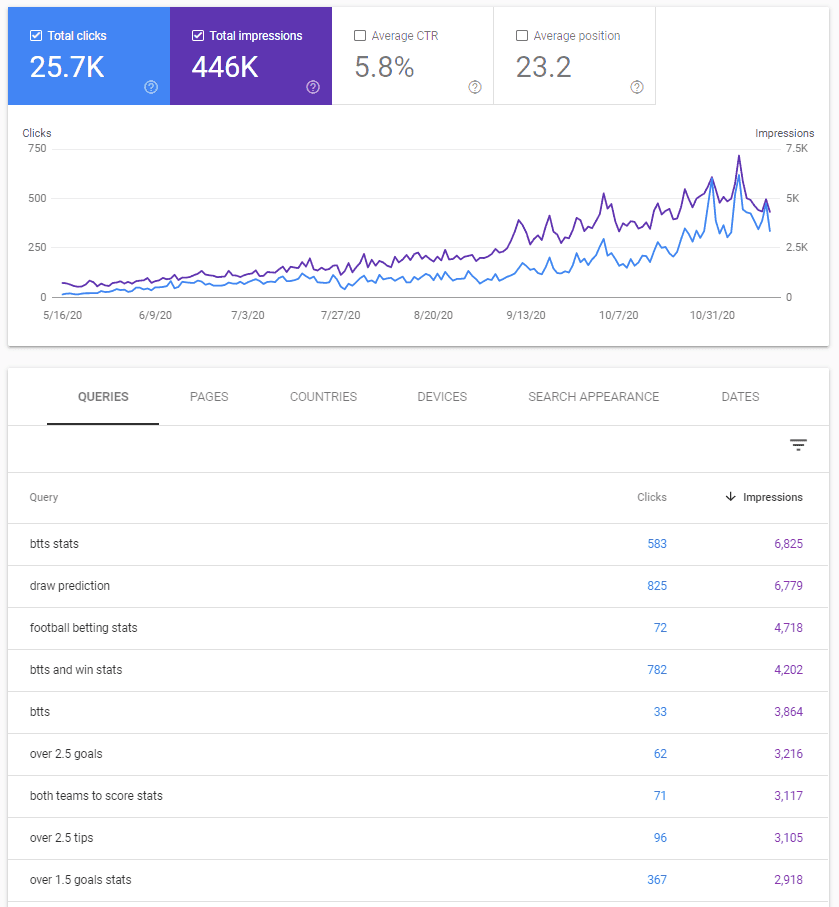The Affiliate Life: My view on iGaming SEO

I mentioned in my last piece that I thought the iGaming SEO space was in disarray. I’m going to touch on that and share some of my iGaming SEO knowledge, considering that’s what I do and how I’ve ended up here in the first place. I thought I’d share some basics and give you an idea of how I’ve ranked my site on page 1 for almost all my phase 1 target keywords within less than 6 months.
Things like: BTTS STATS, GOALS GALORE STATS, FOOTBALL BETTING STATS, CORNERS OVER UNDER STATS, GOALS OVER UNDER STATS, CARDS OVER UNDER STATS
That’s where we start – keywords!
Google still ranks web pages for searches that are nothing more than words! Words are still the key; words are still the primary factor in deciphering what your website is about – So they’re important!
It’s less important to keep track of every keyword you rank for nowadays, but very important to have a collection of general phrases that exemplify your desire to be part of certain search topics. That means collate a list of what I refer to as vanity keywords, a thousand phrases perhaps, that give you a snapshot of where you rank in your sector.
This is what some SEO’s call your keyword universe. It’s a set of target terms that you wish to rank for. These should be phrases that you should/could/would rank for with your current and proposed content. Yes, you can be vain, but you must be honest! I would like to rank for Football Stats, but I have a long way to go before I can reach the echelons of that search term. I have that phrase targeted within my keyword universe, but I also have a dedicated list of short term ‘more achievable’ phrases called my phase 1 target list.
I’m new on the scene, so I need to ease my way into the super competitive search categories with my current set of pages. I have no right to push out websites that have ranked for years with my 6 month old project – So I need to be realistic! But what I can do is hone my current setup towards the kind of phrases that embody my exact offering, I’m talking about my niche!
Instead of football stats, I am focusing my optimisation efforts on football betting stats. A lesser search volume but very much my market and where I want to earn my initial reputation as an expert service provider.
So, these keywords in my keyword universe can be near variants of each other, then slightly similar in a semantic sense and also wide ranging to cover the broad nature of my offering. Terms like btts stats, goals galore stats, over 1.5 goals stats and wdw stats – although it’ll take a while to outrank the Walt Disney World Stats of wdwstats.com (LOL). Oh and of course big, longer term targets like football stats, footy stats, soccer stats and then onto the money terms like football offers and so on. But for now, I’m focussing on a smaller set of say 250 phase 1 targets – my exact niche of football betting stats phrases and near variants.
The Riches are in the niches
What I mean by “near variants” – are phrases that differ slightly but hold the same searcher intent. It’s often the case that these phrases can differ slightly in rank by one or two places, depending on your page experience, but it’s important not to fret. These keyword groupings are supposed to be a guide to where you rank, the difference in rank between variants are not a cue for you to start optimizing differently for each one, they give you a general view of overall performance for that grouping.
An Example grouping:
‘btts stats’ with a close variant ‘btts statistics’ or even ‘stats for btts’ also ‘‘both teams to score stats’ – 5 to 10 close variants are useful, but again they’re a guide on how you perform, you should be monitoring for big shifts in your rank for these phrases rather than the slight movements of individual terms.
Once we have these small groupings, we have to define the page that Google will rank, and it should be one page! If you find you’re querying a small group of keywords over multiple pages, you’re going to run into problems. Whilst it still happens, owning multiple serp listings for a keyword with multiple pages is viewed as a bit of a land grab from Google and they don’t like it! There’s more to that conundrum than can be explained in a single article, but for the sake of this 101 offering, don’t target single sets of near variant keywords to multiple pages!
The key to ranking your pages for those keywords is very simple and this is the mantra that I follow. Consider yourself as the customer and each search term is a problem that you need solved asap. When you consider that phrase against the landing page, are you satisfied instantly with content that solves your need? I’d hope that if you were building an affiliate website like me, you’d know a fair amount about the topic you were presenting content for. That’s why you have to flip your role in that situation and observe the journey from the searchers perspective to landing on the site – are you satisfied from your search query to the solution?
How Google really works
Try this for yourself, give yourself a 5-10 second window, search for something (anything) and click one of the answers. Here’s what happens:
Google understands the nature of your search and presents a list – the serps. You see a meta title, a meta description, a URL and possibly a brand name, you decide if they meet your requirements. You click a listing, then you see a page title, potentially some images and some opening text
If any of those touch points listed above refer to another topic, another set of search queries or something other than what you have searched for, you’ll feel a slight disconnect. You might either ignore it or click through and have to go looking for the “thing” that you searched for! When the 5-10 seconds have passed, if you haven’t been satisfied as a visitor you’ll probably leave.
So, consider those keywords again as hints, btts stats… as a visitor I’m thinking “you better give me some btts stats before anything else or I’m leaving!”
I think this is a problem that is deeply rooted in our historical presentation of content and how affiliates have operated for so long, we’ve been so obsessed with what’s best for us, we forgot to understand what the customer actually wanted.
What’s important here is that I’ve assessed what my visitors will want to see when they land on my website and I have optimised for their journey towards a solution, not for iGaming SEO.
Know thy customer!
Now whilst the touchpoints mentioned above may or may not be ranking factors, they are certainly ranking catalysts. So if I want visitors to land on my page via btts stats, they are going to need to see that information in the Meta title, meta description, the URL, it’s going to be the first thing they see when they land in the page and they won’t have to look more than a second to find that data.
I refer to these touchpoints again as catalysts, we’re so obsessed with asking if they’re ranking factors. I personally say forget using that phrase and think of this logically – if you don’t have those words in your Metas, your page titles, your URL, your content, Google is probably going to find a source that does, because it appears as if they’re more reliable, they are catalysts to google ranking you for your chosen keywords, they do not help you outrank competitors who are doing the same thing. They are catalysts to attract the click when the searcher sees you attempting to cover the topic in the Meta Title, Meta Description & URL in the serps.
Here’s how that basic principle is working out for me…

The reason I say iGaming SEO is in disarray is fundamentally about this principle. Looking around I see sites that have been genuinely fixated by probably the only real ranking factor – links! Their content strategies were good in that the content was attractive and sexy, but it lacked organisation, it lacked user centric planning, but we sat back and acclaimed that content was king, so we argued this was OK.
My favourite myth to debunk in this sector is that patterns within an industry make bad practice. OK!
That’s somewhat true, but only in that iGaming sites had such bad SEO at one time, you only had to improve your optimisation by 5% to be the best of a bad bunch – buying not so cr*p links was better than buying really cr*p links.
Big operators and affiliate owning investment groups to this day are still haemorrhaging hefty budgets on link schemes from agencies that you’d be more likely to find on Fiverr, the link profiles are disgusting and this has actually played into the hands of the smaller affiliate with somewhat lesser bad budgets. They’re tactics are still bad, they’re just not as bad as the big budget groups smashing cash on link schemes!
It’s going to be so easy to come and out rank these guys with patient, user-centric content strategies, a small set of links and a simple site, they’ll baffle at the budgets they’ve hosed on their 20 person iGaming SEO departments!
So…?
We’re halfway through launching a football stats website with some basic iGaming SEO intelligence to help prove my theories. Next month, it’s time to start taking on the affiliate search space!
If you are an affiliate manager, we’d love to hear from you. Email us at [email protected] to get the ball rolling.
——————
This promoted content is produced by an advertiser of Affiverse. This is a paid-for Advertorial content supplied by StatsChecker.com. Affiverse allows affiliates, operators, agencies and SaaS providers to share their news, opinion and insights with Affiverse’s audience both online and via our newsletters. To advertise with us – contact: [email protected]






